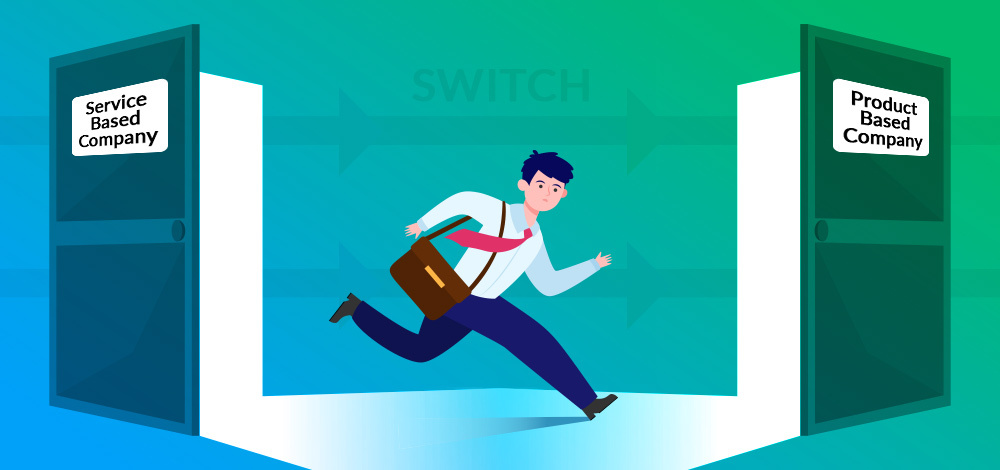If you’re a software engineer and loaded with lots of rigid work, little to less work-life balance, and bare minimum pay, it’s understandable to become frustrated because of your service-based job. Let’s agree that no one wants to get stuck in some monotonous service-based company where there’s no thrill left to enjoy. So, if you’ve finally decided to switch to a product-based company or just looking out for answers to questions like “how to switch from service-based to a product-based company” or “how to get into product-based companies”, you’ve come to the right place.
Software Engineers – no matter which type of company they are placed in – thrive regardless because of their on-demand capabilities. However, if you as a software engineer can get extra benefits like amazing incentives along with a big paycheck, flexible job timing, and many more things that can boost your motivation to work 10x times. Wouldn’t you start loving your work as well?
Well, you can get all of these things from pay scale some days product-based companies. While it’s important to get a job that defines your job profile perfectly but it’s also crucial to notice how your work environment affects you when it comes to switching companies.
Before moving forward to understand how to switch from a service-based to a product-based company, you should know first what product-based companies and service-based companies do.
What is a Service-Based Company?
Service-Based Companies mainly provide services to 3rd party organizations. They offer services like –
- Software Development
- Maintenance of Software
- Consulting Services
- Business Performance Management
Some notable service-based IT companies are Infosys, Wipro, TCS, HCL, Cognizant, etc.
What is a Product-Based Company?
Product-based companies create new products related to their specific domains. For example – MAANG companies (Meta/Microsoft, Amazon, Apple, Netflix, and Google). They manufacture their own products and then, periodically upgrade their performance.
To dive deeper into their difference, check this table:
|
Product-Based Companies |
Service-Based Companies |
|---|---|
| Product-based companies make their own product. | Service-based companies help other companies to sell their product through their services. |
| Product-based companies hire selectively and take a few candidates for different roles from the lot. They don’t conduct placement in Tier 3 colleges. | Service-based companies are into mass recruitment and hire in masses through on-campus placement. |
|
Product companies typically offer competitive salaries. Many of the world’s highest-paying companies for software engineering talent are product-based companies like MAANG and other Tier-1 tech companies. Freshers at product-based companies are mostly paid 10-14L per year. |
Service-based companies don’t really provide a big pay scale compared to product-based companies. The pay is quite low compared to market standards. Even the annual hike is negligible. Freshers at service-based companies are mostly paid 3-5L per year. |
| You get to do projects which require a box thinking. You get to work on exciting projects and highly skilled teams on cutting-edge technologies. | You rarely get to do projects in service-based companies that require you to do out-of-box thinking. You’ll be mainly assigned support projects. |
| The interview rounds are quite rigorous. | It’s easy to pass interview rounds in service-based companies. |
| Office timings are flexible. | Office timings are strict and you’ve to work according to the client’s timezone. So, basically, you’re doing a job for more than 12 hours some days. |
These are some of the differences between product-based and service-based companies. You can read more about the same in our article Difference Between a Product Based Company and Service Based Company.
How to Get Into Product-Based Companies?
Every service-based company’s employees wonder how hard it can be to switch from a service-based company to a product-based company. Getting into a product-based company may be more challenging than getting into a service-based one. When it comes to recruiting individuals, service-based businesses often go through interview rounds that involve aptitude tests, coding tests, and technical and HR rounds.
Whereas product-based organizations often go through interview rounds that involve online coding assessments, and behavioral and technical interviews. Clearing these rounds is more difficult than competing for service-based companies’ coding and interview rounds. They are more concerned with problem-solving abilities. However, as long as you are constant in your efforts, switching to a product-based company is not a tough nut to crack.
Most software engineers switch to a product-based company after a year or two of working in a service-based company. If you’re already in a service-based IT company, you might have a little disadvantage as most product-based IT companies seek candidates who already have experience in product-based companies.
However, this is not something that you can’t overcome if you know the right way to grab recruiters’ interest through LinkedIn or from a friend’s referral in a product-based company. You can also apply through online job portals. Ensure that your resume is ATS compiled and you’ve included all the relevant key skills, achievements, and keywords that can grab recruiters’ eyes.
Read these articles to understand how you can format your resume for top tech companies:
How to Prepare for Product-Based Company Interviews?
Resume Shortlisting & Initial Screening
Many companies receive more than 1000 resumes and it’s not easy to go through all of them manually. This is where ATS comes in handy. Recruiters shortlist just those resumes that stand out or match the job descriptions the best. The majority of candidates are rejected at this stage.
You should be able to pass through if you have done solid projects and created an ATS-proof resume. If you don’t know where to create an ATS-proof resume, you can refer to our FREE neveropen Resume Builder.
Machine Coding Round/LLD
Companies such as Cred, Flipkart, Swiggy, and a few others have begun recruiting through the machine coding round as the first round. This round will assess your coding and low-level design abilities. It asks you to develop and write a generic issue solution utilizing the best coding principles, particularly object-oriented programming. In this round, a scenario is given to you based on which you have to solve those questions in a given time duration. The majority of applicants are eliminated in this round.
Also, you should know that this round is totally optional based on the company as some companies conduct this round whereas some don’t (Microsoft, Google, and Adobe).
Online Coding Round
The majority of product-based companies employ mainly data structure and algorithm interviews. The primary concept behind this interview is to assess your problem-solving abilities by having you figure out the correct data structures and methods to solve logical challenges. It is quite unlikely that you will be accepted into a product-based firm unless you are proficient in DSA.
Technical Interview
In this round, you might get asked about data structures and algorithms problems, basic technical questions, prior knowledge, and side projects. You also need to have knowledge of full stack and Java and let us tell you – we’ve got some great courses for you to learn these two courses at your own pace. Considering taking these courses:
Design Round
If you’re a fresher, you might not come across this round. However, if you’re an experienced professional, you’ll get asked questions about OOPs concept and System Design in this interview round. During this interview round, you will need to develop design solutions. In this interview, your approach will be more important than finding the right solution. Design interviews are important for senior positions.
If you’re a working professional and want to study more about System Design to crack SDE, SSE, Architect, Technical PM, and SDM jobs, then make sure to register for neveropen’ – Mastering System Design Course.
Behavioral Round
The interview concludes with an HR/Behavioral round. The interview will put both your technical and non-technical abilities to the test. The projects you describe in your resume are very important in your selection. Puzzles, data structures and algorithms, structured query language, object-oriented programming, and computer principles might all be covered in this round.
To clear this round, try to construct your answers by using the STAR method (Situation, Task, Action, Result).
How To Prepare For Product-based Companies?
Now that you are familiar with the interview process and rounds, let’s check how you can prepare to switch from service-based companies to product-based companies.
1. Focus on coding languages that can strengthen your coding skills. Start your learning journey with C++ or Java. Make sure you’re thoroughly familiar with these languages, enough to solve questions at a high speed and with accuracy. Learn basic data structures and algorithm concepts like an array, linked list, stack, queue, binary tree, hash maps, searching, sorting, and two pointers.
If you want to learn the basic programming languages and don’t know where to start your learning journey from. You can consider checking out these courses:
2. Learn Object-Oriented Programming (OOP) as it is used in almost all product-based companies. Furthermore, it is also tested in the machine coding and low-level design rounds. Getting prepared for projects can be made easier with an understanding of OOP concepts and some hands-on experience. You can check out the best practices of OOP.
3. Ensure that you’re familiar with basic DSA foundations. DSA Foundations is a critical topic in Data Structures and Algorithms. You should learn how to calculate a solution’s time and space complexity. Many people skip this phase, which makes optimizing their solutions challenging. Assuming that you’re a working professional and want to learn DSA from scratch to ace interviews in product-based companies, then our DSA Live for Working Professionals – Live course is the perfect course for you to strengthen your foundation. Only practice can make you strong in this domain, so ensure that you spend your timing on practicing DSA questions on our practice portal.
4. Make sure that your theory part is strong. Learn core topics like DBMS, OS, and Computer Networks and as well as intermediate SQL. Hiring managers might ask you to write some SQL queries during the interview process.
You can refer to this article to dive deeper into this topic: How to Get a Job in Product-Based Companies?
Conclusion
Switching from a service-based company to a product-based company is not as tough as it seems. All you need to do is give your 100% by learning all the basics of DSA, practicing the problems, taking regular mock interviews, and even participating in competitive programming contests. Make sure to complete this SDE Sheet to ace your technical interview round.
Once you’re ready with enough knowledge to tackle tough questions, you can start applying right away through job portals and internal referrals. By doing all of these practices, it’s a matter of time to get a high-paying job at your dream product-based company.





